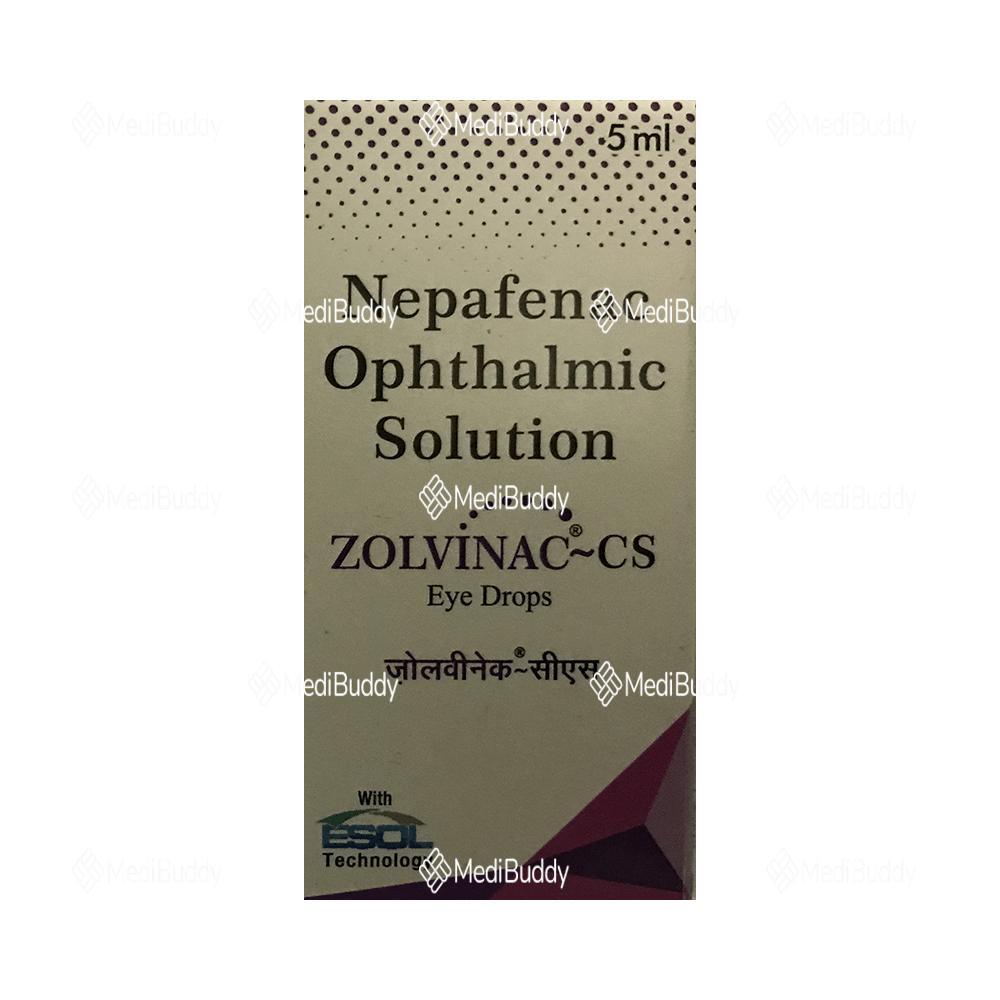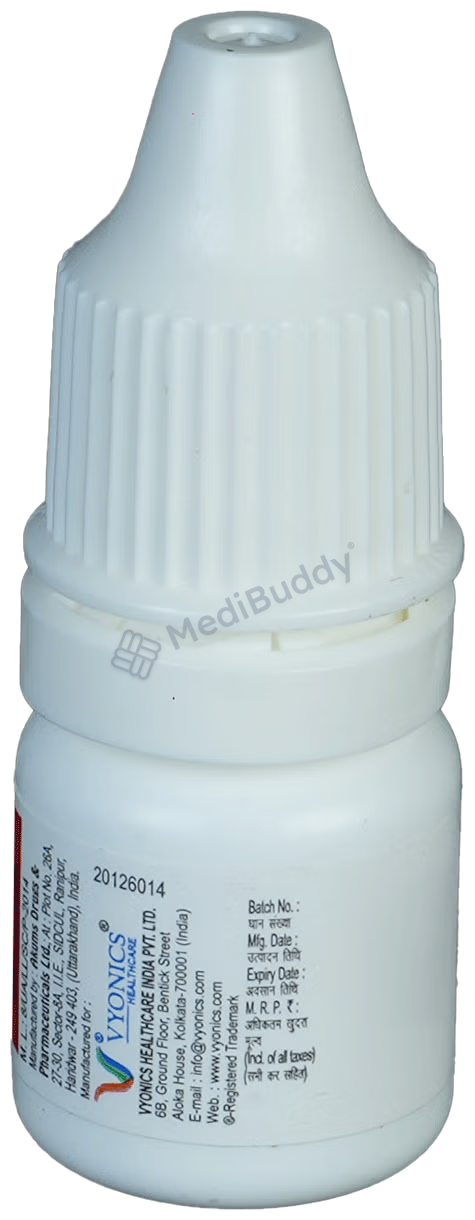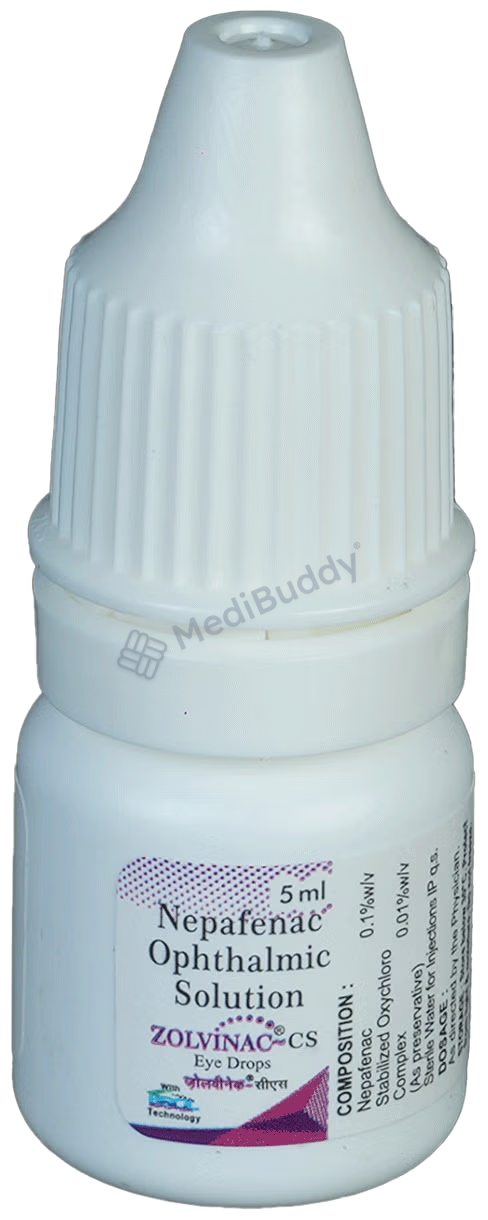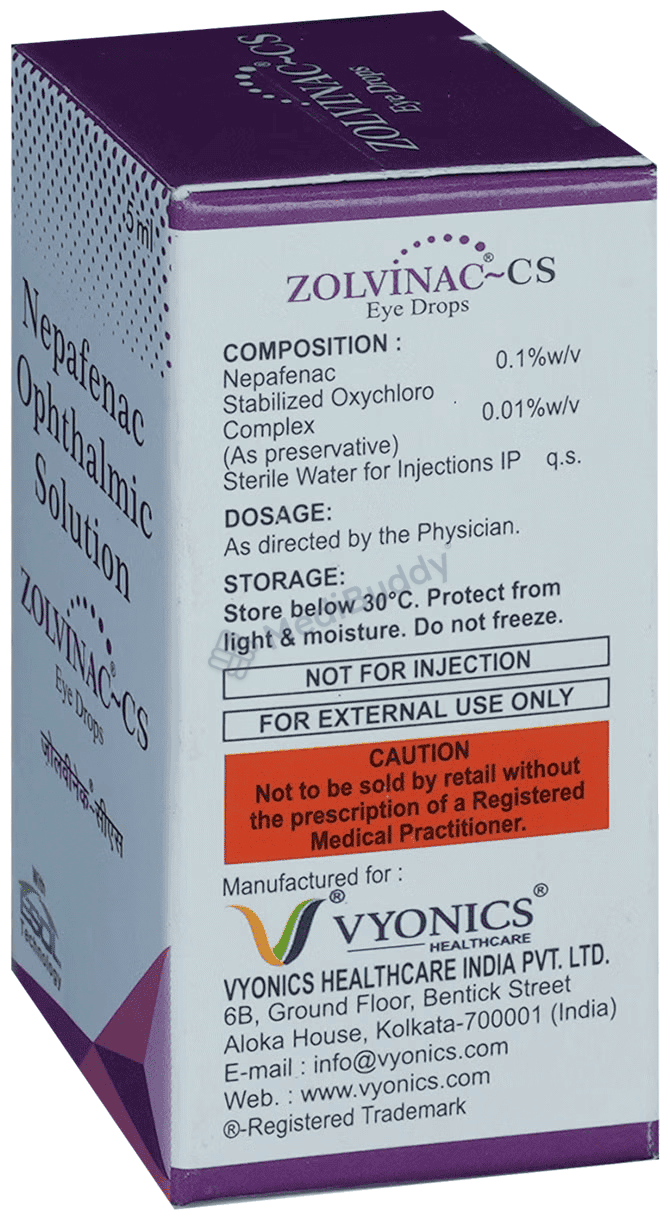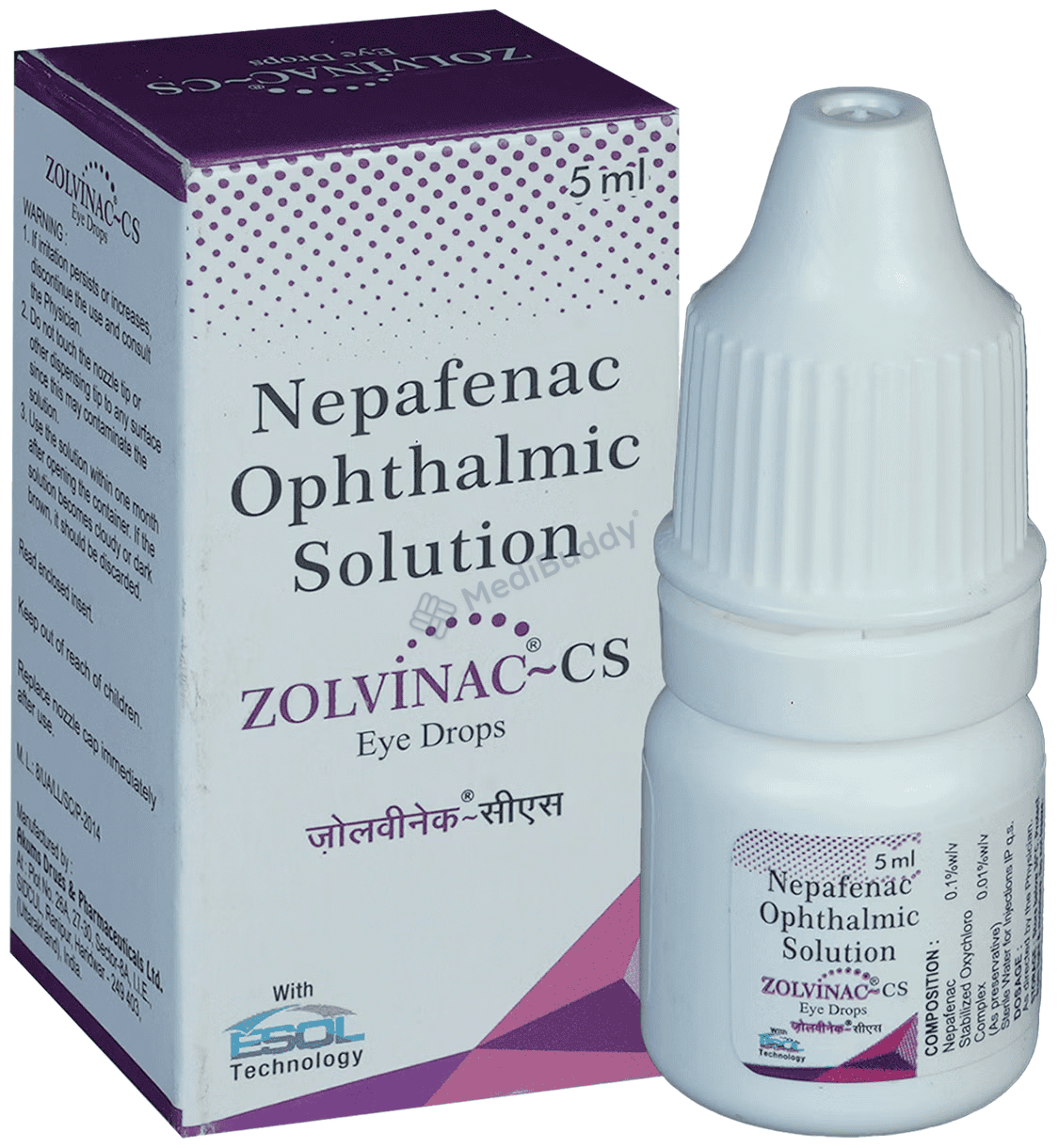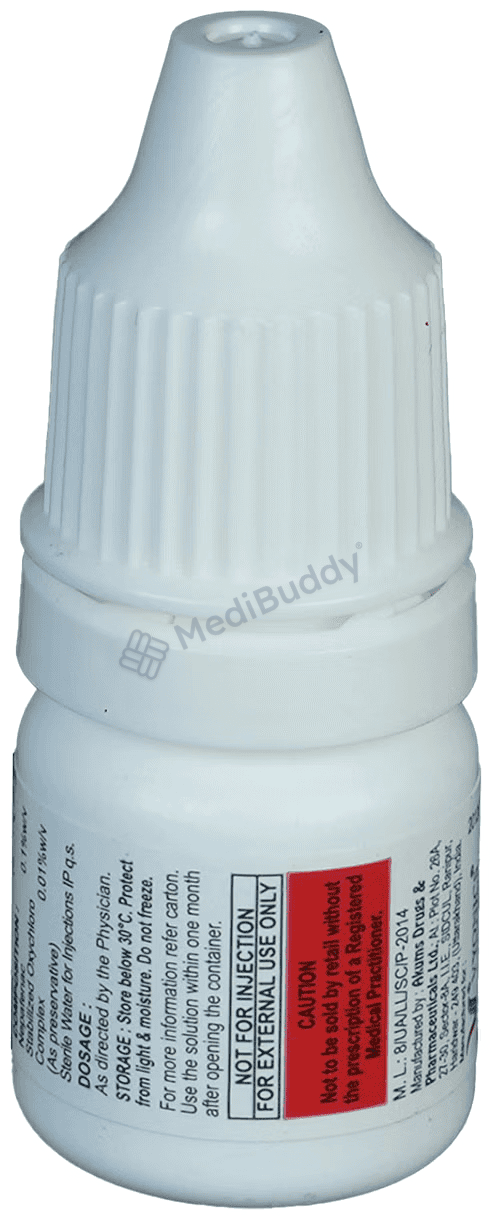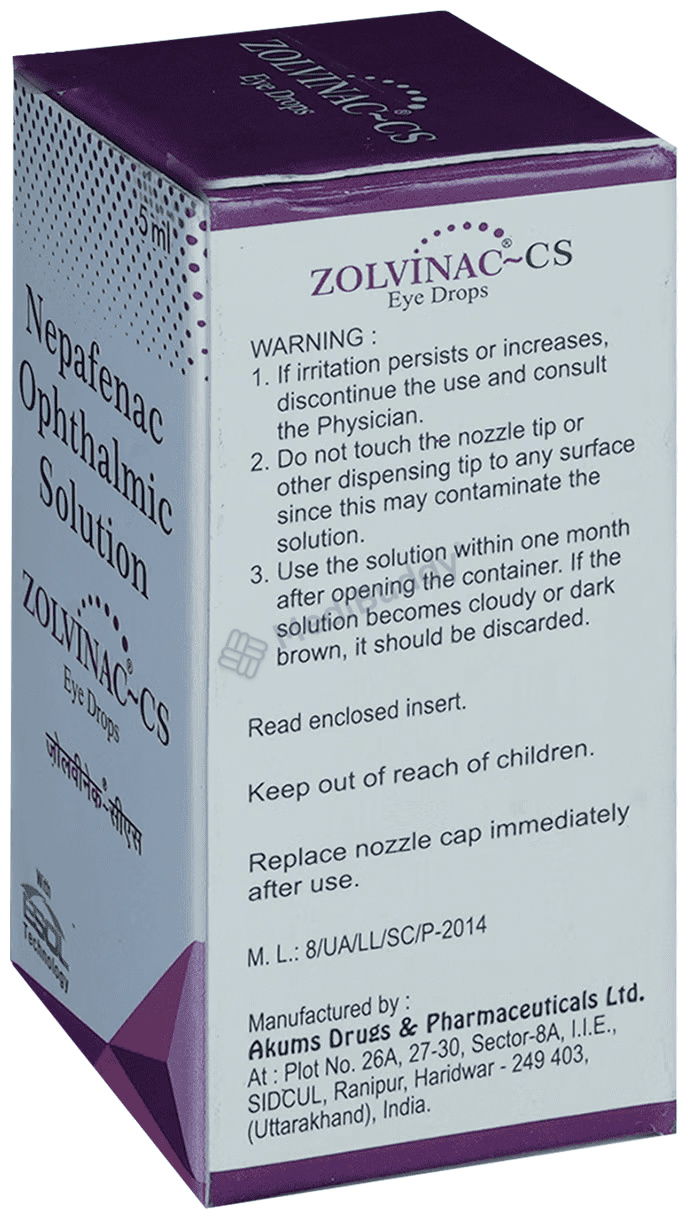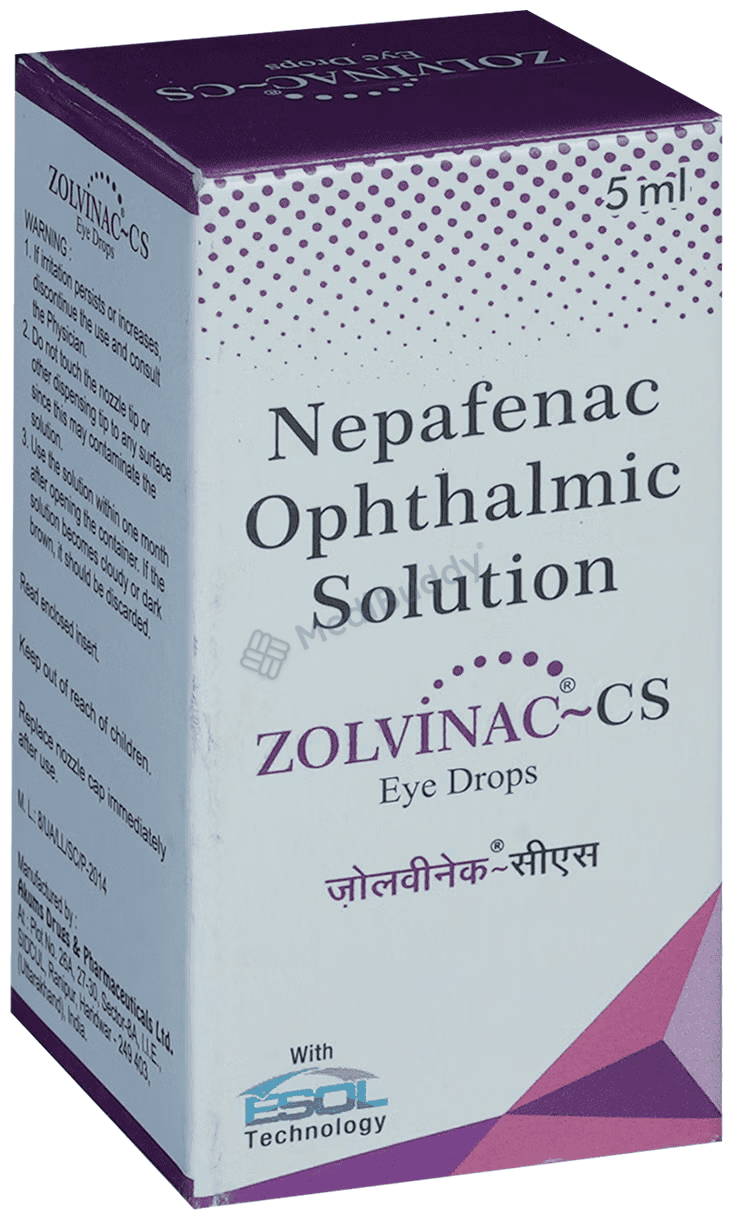Zolvinac-CS Eye Drop
By Zolvinac
Rx
5ml Ophthalmic Solution in a Bottle

Composition
Nepafenac(0.1% w/v)

Manufacturer - Vyonics Health Care Pvt Ltd
6B, Bentick Street, Ground Floor, Aloka House Kolkata - 700001, West Bengal (India)

Expires on or after
April, 2027
About Zolvinac-CS Eye Drop
Zolvinac-CS Eye Drop is a medication used to relieve pain and inflammation following cataract surgery. It works by blocking certain chemicals in the eye that are responsible for pain and swelling, making the healing process more comfortable and promoting faster recovery. It is recommended to wash your hands before using the eye drops and follow the prescribed dosage instructions. Removing contact lenses before application and waiting before reinserting them is also advised to prevent any potential complications. Touching the dropper or bottle tip should be avoided to prevent infection.
This eye drop contains Nepafenac, which is a nonsteroidal anti-inflammatory drug (NSAID) that inhibits the action of certain enzymes responsible for causing eye pain, redness, and inflammation. It is specifically designed to address eye irritation, pain, and redness post-cataract surgery. Additionally, it helps reduce the risk of macular edema, a condition that can lead to vision loss, especially in diabetic patients undergoing cataract surgery. Common temporary side effects may include decreased vision, a sensation of a foreign body in the eye, and increased intraocular pressure, but these usually subside over time.
Before using Zolvinac-CS Eye Drop, it is important to inform your doctor about any other medications you are taking and any existing medical conditions. Pregnant and breastfeeding women should consult their healthcare providers before using this medication. Individuals allergic to the drug or those with certain medical conditions such as diabetes, arthritis, bleeding disorders, or dry eye syndrome should not use Zolvinac-CS Eye Drop without medical guidance. It is recommended not to use the eye drops for more than 14 days post-cataract surgery unless advised by a doctor and to avoid direct contact of the dropper with the eye to prevent infection.
Benefits
Zolvinac-CS Eye Drop offers valuable benefits in the treatment of post-operative eye pain and inflammation. Following eye surgery, this medication is designed to alleviate symptoms such as pain, redness, swelling, itching, and excessive tearing of the eyes. By targeting the reduction of specific chemical compounds that trigger eye inflammation, Zolvinac-CS Eye Drop effectively eases discomfort and allows individuals to resume their daily routines more comfortably. Functioning as a nonsteroidal anti-inflammatory drug (NSAID), Zolvinac-CS Eye Drop contains Nepafenac which works to prevent and relieve pain and inflammation commonly associated with procedures like cataract surgery. By inhibiting the action of prostaglandin H synthase, an enzyme crucial for prostaglandin production, this medication effectively mitigates the manifestations of post-operative eye discomfort. Moreover, Zolvinac-CS Eye Drop is also beneficial in reducing the likelihood of macular edema, a common complication following cataract surgery. Patients are advised to adhere to the prescribed dosage to fully leverage the advantages of this medication. In case there is no noticeable improvement within a week of using Zolvinac-CS Eye Drop, consulting with a healthcare provider is recommended to explore further options.
How to use the Zolvinac-CS Eye Drop
To use Nepavon-CS Eye Drops properly, follow these steps as advised by your doctor. Wash your hands thoroughly before and after using the eye drops. Lie down and tilt your head backward to prepare for application. Gently pull down your lower eyelid with your index finger to create a pocket. Be careful not to touch the eye with the dropper tip. Squeeze the dropper to instill the recommended number of drops into the pocket of your lower eyelid. Close your eyes for 1-2 minutes to allow the medicine to be absorbed. After use, replace the outer cap securely. Remember not to contaminate the eye drops by touching the tip of the container to your eye or its surroundings.
It is important to use Nepavon-CS Eye Drops only as directed by your physician. Tilt your head slightly back and position the container close to your eyes without making contact. Gently pull your lower eyelid and administer the prescribed number of drops into the pocket formed. After instillation, close your eyes and apply light pressure to the inner corner of your eye for 2 minutes. If directed, repeat the same process for the other eye. Avoid touching the container's tip to your eyes, eyelids, or any adjacent areas to prevent contamination.
Remember, your doctor will determine the appropriate dosage and duration of treatment based on factors such as your age, weight, and overall health. By following these steps carefully and following your doctor's instructions, you can effectively use Nepavon-CS Eye Drops for ophthalmic purposes.
Uses of Zolvinac-CS Eye Drop
Zolvinac-CS Eye Drop is used to treat post-operative eye pain and inflammation, specifically targeting these symptoms after cataract surgery. It is effective in both treating and preventing eye pain and inflammation that may occur following this type of surgical procedure. Additionally, this eye drop is particularly beneficial for diabetic patients as it helps prevent the risk of macular edema, a condition that can develop after cataract surgery in diabetic individuals. By using Zolvinac-CS Eye Drop as directed, patients can manage their post-operative symptoms effectively and reduce the likelihood of complications, providing comfort and aiding in the healing process.
What conditions Zolvinac-CS Eye Drop treats?
After cataract surgery, patients may experience vision issues like cloudy, wavy, or distorted vision. Adjusting to the new intraocular lens can take time. Temporary red, dry, or bloodshot eyes can occur due to blood vessel damage during surgery, but these symptoms typically improve as the eye heals.
Should you consult a doctor?
If you have a skin allergy or severe inflammation in your nose after using pain relieving medicines, avoid using NEPAVON-CS Eye Drops. It's crucial to inform your doctor before using this medication if you easily bruise or have bleeding issues, an eye infection, diabetes, rheumatoid arthritis, or have undergone multiple eye surgeries in a short timeframe. Seeking a doctor's advice is essential in these circumstances to ensure the safe and effective use of NEPAVON-CS Eye Drops.
Side effects of Zolvinac-CS Eye Drop
When using Zolvinac-CS Eye Drop, some side effects may occur. These side effects are usually mild and temporary. Common side effects include decreased vision, a feeling of having something in your eye, increased pressure in the eye, and a sticky sensation. You may also experience blurred vision, changes in vision, and eye discomfort. Other possible side effects are eyelid crusting or drooping, visual disturbances, a sensation of having a foreign body in the eye, dry eye, swelling of the eyelids, itchy eyes, eye discharge, increased tear production, dizziness, and headaches. It is important to note that most side effects tend to resolve on their own as your body gets used to the medication. However, if any of these side effects persist or if you are concerned about them, it is advisable to consult your doctor. In rare cases, if you experience severe eye pain accompanied by redness, which may indicate inflammation of the iris, stop using Zolvinac-CS Eye Drop immediately and seek immediate medical attention.
Safety advice

liver
When considering the use of Zolvinac-CS Eye Drop, there is no known interaction or established data related to liver issues. This lack of information means there is no specific caution or safety advice for individuals with liver concerns when using this eye drop. It is always recommended to consult with your doctor for proper guidance before using Zolvinac-CS Eye Drop, especially if you have any underlying liver conditions or concerns. Your healthcare provider can offer personalized advice based on your individual health status.

kidney
No interaction found with Zolvinac-CS Eye Drop.

alcohol
No interaction has been found or established between consuming alcohol and Zolvinac-CS Eye Drop. It is recommended to consult your doctor for advice regarding alcohol consumption while using this medication.

driving
After using Zolvinac-CS Eye Drop, your vision may be blurred briefly. Avoid driving until your vision returns to normal.

pregnancy
Zolvinac-CS Eye Drop may not be safe to use during pregnancy due to potential harm to the baby based on animal studies. Consult your doctor for a thorough evaluation of benefits and risks before using it.

breastfeeding
It is better to consult your doctor before using Zolvinac-CS Eye Drop.
Age above 75(Geriatrics)
Age below 6 months(Pediatrics)
Consumption warning before consuming Zolvinac-CS Eye Drop
Before using Nepavon-CS Eye Drops 5 ml, it is crucial to be aware of certain precautions to ensure safe usage. Individuals allergic to this medication should avoid it, as it can lead to adverse reactions in the eyes. Inform your doctor if you have conditions like dry eye syndrome, arthritis, diabetes, or blood-clotting disorders such as hemophilia. It is recommended not to use Nepavon-CS Eye Drops for over 14 days post-surgery unless advised by a healthcare professional. This medication falls under FDA pregnancy category C, and its impact on unborn babies is not fully understood. If pregnant or planning to conceive, consult a doctor before using Nepavon-CS Eye Drops to ensure the safety of both you and your baby.
What if you forgot to take Zolvinac-CS Eye Drop?
If you forget to use Zolvinac-CS Eye Drop at the scheduled time, try to use it as soon as you remember. But if it's close to the time for your next dose, skip the missed one and continue with your regular dosing schedule. It's important not to double up on doses to make up for a missed one. This helps maintain the proper balance of medication in your system and reduces the risk of potential side effects. Remember to follow the recommended dosing instructions to ensure the effectiveness of Zolvinac-CS Eye Drop treatment.
What happens if you take overdose of Zolvinac-CS Eye Drop?
In case of an overdose or accidental use of too much NEPAVON-CS Eye Drops, it is important to act promptly. First, rinse the affected eye with warm water to help flush out the excess solution. If irritation continues or worsens, it is advisable to seek medical advice from a doctor. Prompt action can help minimize any potential side effects or complications from an overdose of the eye drops.
Additional Information
| Habit Forming | No |
| Chemical Class | Benzophenone Derivatives |
| Therapeutic Class | OPHTHAL |
| Action Class | NSAID's- Non-Selective COX 1&2 Inhibitors (Topical) |
FAQs
Disclaimer
The information provided on this website is to the best of our abilities to ensure it is accurate, reliable, and reviewed by a team of professionals. It should not be used to diagnose, prevent, or cure any health problem. The information presented here is not intended to create a doctor-patient relationship or replace a registered medical practitioner's advice, diagnosis, or treatment. The absence or provision of any information or warning regarding any medicine should not be assumed as an implied or explicit assurance of safety or efficacy. We highly recommend consulting your registered medical practitioner for all queries or doubts related to your medical condition. Do not ignore professional medical advice or delay seeking it based on the content encountered on our website. We intend to support, not replace, the doctor-patient relationship.
₹285
Inclusive of all taxes
Content verified by

Dr. Upasana Bhatia
MBBS - General Medicine
Last update on 11-Feb-2025
